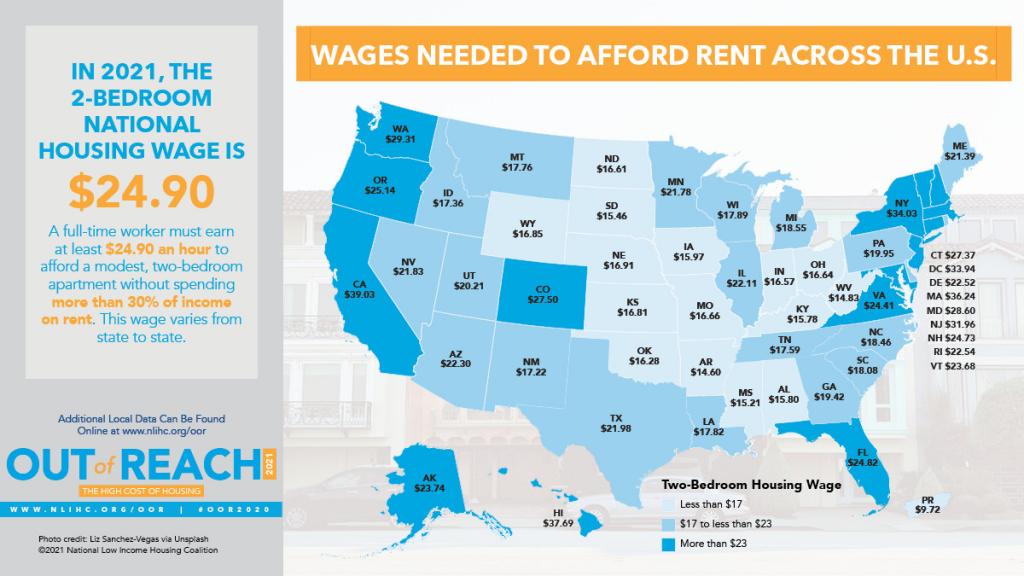Comparing rental housing costs to wages reveals just how out of reach the housing market is for low-income earners.

A recent report from the National Low Income Housing Coalition quantifies housing costs relative to wages in the states and cities around the United States.
The "Out of Reach 2021" report uses a statistic called "Housing Wage" to measure the gap between renters' wages and the cost of rental housing in the United States. Housing Wage estimates the hourly wage a full-time worker must earn to afford a modest rental home at HUD’s fair market rent (FMR) without spending more than 30% of his or her income on housing costs.
According to the report, the average full-time worker needs to earn an hourly wage of $24.90 to afford a modest, two-bedroom rental home in the United States. With the federal minimum wage set at $7.25 an hour, it's easy to see that many would have to work multiple jobs at that wage to afford rent. The hourly wage of $24.90 is also significantly higher than the average hourly wage earned by U.S. renters—$18.78.
An article by Andrew Chamings picked up the news fo the report for SFGate, noting the report's findings for San Francisco. "Data shows that if you earn minimum wage in San Francisco — that's $16.32 an hour — you need to work 4.9 full time jobs a week to afford a fair market rent two-bedroom apartment. That's 196 hours, more hours than there are in a week," writes Chamings.
"Data shows that if you earn minimum wage in San Francisco — that's $16.32 an hour — you need to work 4.9 full time jobs a week to afford a fair market rent two-bedroom apartment. That's 196 hours, more hours than there are in a week..."
Chamings also notes that California is the least affordable state for a low-income earner in the entire country, according to the report. The most affordable state for low-income earners is Arkansas.

FULL STORY: Out of Reach 2021

Maui's Vacation Rental Debate Turns Ugly
Verbal attacks, misinformation campaigns and fistfights plague a high-stakes debate to convert thousands of vacation rentals into long-term housing.

Planetizen Federal Action Tracker
A weekly monitor of how Trump’s orders and actions are impacting planners and planning in America.

In Urban Planning, AI Prompting Could be the New Design Thinking
Creativity has long been key to great urban design. What if we see AI as our new creative partner?

King County Supportive Housing Program Offers Hope for Unhoused Residents
The county is taking a ‘Housing First’ approach that prioritizes getting people into housing, then offering wraparound supportive services.

Researchers Use AI to Get Clearer Picture of US Housing
Analysts are using artificial intelligence to supercharge their research by allowing them to comb through data faster. Though these AI tools can be error prone, they save time and housing researchers are optimistic about the future.

Making Shared Micromobility More Inclusive
Cities and shared mobility system operators can do more to include people with disabilities in planning and operations, per a new report.
Urban Design for Planners 1: Software Tools
This six-course series explores essential urban design concepts using open source software and equips planners with the tools they need to participate fully in the urban design process.
Planning for Universal Design
Learn the tools for implementing Universal Design in planning regulations.
planning NEXT
Appalachian Highlands Housing Partners
Mpact (founded as Rail~Volution)
City of Camden Redevelopment Agency
City of Astoria
City of Portland
City of Laramie





























